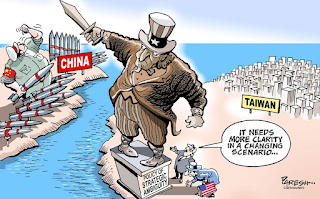Military Differences and Potential Consequences of a Confrontation Between China and the U.S. in Taiwan part 2
The Potential Military Confrontation (Chian toward Taiwan)
China has
been investing heavily in its military over the past few decades, and the
country's military capabilities have grown significantly. China's military
budget is now the second largest in the world, and the country has been
developing advanced technologies such as stealth fighters, hypersonic missiles,
and aircraft carriers.
However, the
United States remains the world's dominant military power. The U.S. military
budget is still larger than China's, and the U.S. military has been developing
its own advanced technologies, such as the F-35 fighter jet and the B-21
bomber.
If a
confrontation were to occur between China and the United States over Taiwan, it
would likely involve a combination of naval and air power. China has been
building up its naval capabilities, and the country now has the world's largest
navy in terms of the number of ships. However, the quality of China's naval forces
is still considered inferior to that of the United States.
In terms of
air power, China has been developing its own fighter jets and missiles, but its
air force is still considered inferior to that of the United States. The U.S.
Air Force has a large number of advanced fighter jets, bombers, and unmanned
aerial vehicles, and is considered the most technologically advanced air force
in the world.
If a
military confrontation were to occur over Taiwan, it is likely that the United
States would use its superior naval and air power to try to prevent China from
invading Taiwan. This would likely involve a combination of naval and air
patrols, as well as the deployment of ground troops to Taiwan.
However,
China would not be an easy opponent. The country has invested heavily in
anti-ship and anti-aircraft missile systems, which could pose a significant
threat to U.S. forces. Additionally, China has been developing its own stealth
fighters, which could make it more difficult for U.S. planes to operate in the
region.
If a
military confrontation were to occur, it would likely have far-reaching
consequences. It could lead to a major conflict between the world's two largest
powers, with potentially devastating consequences for the global economy and
security.
Additionally,
it could lead to a major shift in the balance of power in the region. If China
were to successfully invade Taiwan, it would represent a major victory for
China and could embolden the country to make further territorial claims in the
region. This could lead to a major destabilization of the region and threaten
the security of U.S. allies.
Furthermore,
a military confrontation between China and the United States could have serious
implications for the global economy. China is the world's second-largest
economy, and a major conflict could lead to a disruption of global trade and
investment flows.
In
conclusion, the case for invading Taiwan is based on the security threat posed
by China's aggression toward the island. However, any military confrontation
between China and the United States over Taiwan would have far-reaching
consequences and could have serious implications for the global economy and
security. As such, it is important that all parties work to find a peaceful
resolution to the situation, one that respects the autonomy and democratic
values of Taiwan while also ensuring regional stability and security.



Comments
Post a Comment